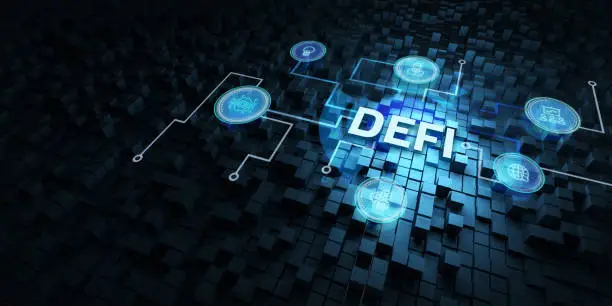Introduction

Table of Contents
Decentralized Finance (DeFi) is a financial system based on blockchain that does away with intermediaries such as banks and brokers. Through the use of smart contracts and decentralized applications (dApps), DeFi allows users to trade, lend, borrow, and earn interest on digital assets without the need for conventional financial institutions. This article discusses the basics of DeFi, its main components, advantages, disadvantages, and potential future.
What is DeFi?
Decentralized Finance in short DeFi is a group of financial services constructed on blockchain networks, mostly Ethereum. It is geared towards creating an open and transparent financial system where users have complete control over their assets. Unlike conventional finance, DeFi relies on decentralized networks, which means that financial services are available to anyone with internet access.
Key Components of DeFi
DeFi involves several financial applications such as:
- Decentralized Exchanges (DEXs): Exchanges such as Uniswap, SushiSwap, and PancakeSwap enable users to exchange cryptocurrencies without the need for intermediaries.
- Lending and Borrowing Protocols: Sites such as Aave, Compound, and MakerDAO permit users to lend crypto and receive interest or borrow assets against collateral.
- Stablecoins: Cryptocurrencies such as USDC, DAI, and USDT have a stable value since they are pegged to fiat currencies.
- Yield Farming & Liquidity Mining: DeFi protocols receive liquidity from users in return for rewards and incentives.
- Derivatives and Synthetic Assets: They enable one to trade tokenized representations of real-world assets such as stocks and commodities through platforms like Synthetix.
- Insurance Protocols: Companies such as Nexus Mutual offer decentralized insurance cover against smart contract failure and hacks.

How DeFi Works
DeFi platforms are developed on blockchain networks through smart contracts, which execute transactions automatically and eliminate intermediaries. This is how DeFi functions:
- Smart Contracts: Automated contracts that regulate financial transactions.
- Decentralized Networks: Public blockchains such as Ethereum provide transparency and security.
- Tokenization: Virtual assets embody real-world value, enabling smooth transactions.
- Liquidity Pools: Assets are deposited by users into pools that enable trading, lending, and borrowing. Also Virtual assistant is becoming most popular job in today’s world. Because its also very popular way to make money online.

Advantages of DeFi
DeFi has several benefits compared to traditional finance:
- Accessibility: Anyone with access to the internet can use financial services.
- Transparency: Blockchain transactions are transparent and publicly verifiable.
- Lower Fees: DeFi cuts out intermediaries, lowering transaction fees.
- Financial Inclusion: Unbanked individuals can join the financial system.
- Programmability: Smart contracts execute complex financial processes automatically. Also, you can earn money with the transcription job because its one of the easy way to make money online.
Risks and Challenges
Despite its promise, DeFi is subject to several risks:
- Smart Contract Vulnerabilities: Code bugs and exploits can result in hacks.
- Regulatory Uncertainty: Governments are still developing policies regarding DeFi.
- Market Volatility: Crypto assets are extremely volatile, impacting liquidity and stability.
- Scalability Issues: Network congestion and high transaction fees restrict usability.
- Impermanent Loss: Liquidity providers can suffer losses as a result of price fluctuations. Also, you can earn money with the data entery because its also one of the best online work in industry.
The Future of DeFi
DeFi is constantly improving, with the most important developments being:
- Cross-Chain Interoperability: Improved connectivity among blockchains for easy transactions.
- Layer 2 Scaling Solutions: Solutions such as Optimistic Rollups and zk-Rollups decrease fees and enhance speed.
- Institutional Adoption: Traditional finance is investigating DeFi integration for increased efficiency.
- Decentralized Identity: Advances in privacy and security will enhance DeFi’s reliability.
Conclusion
DeFi is revolutionizing the financial sector by offering decentralized, transparent, and accessible financial services. Although it has challenges, continuous technological innovations and growing adoption indicate a bright future. As DeFi continues to mature, it can potentially redefine the way we deal with money and financial services.